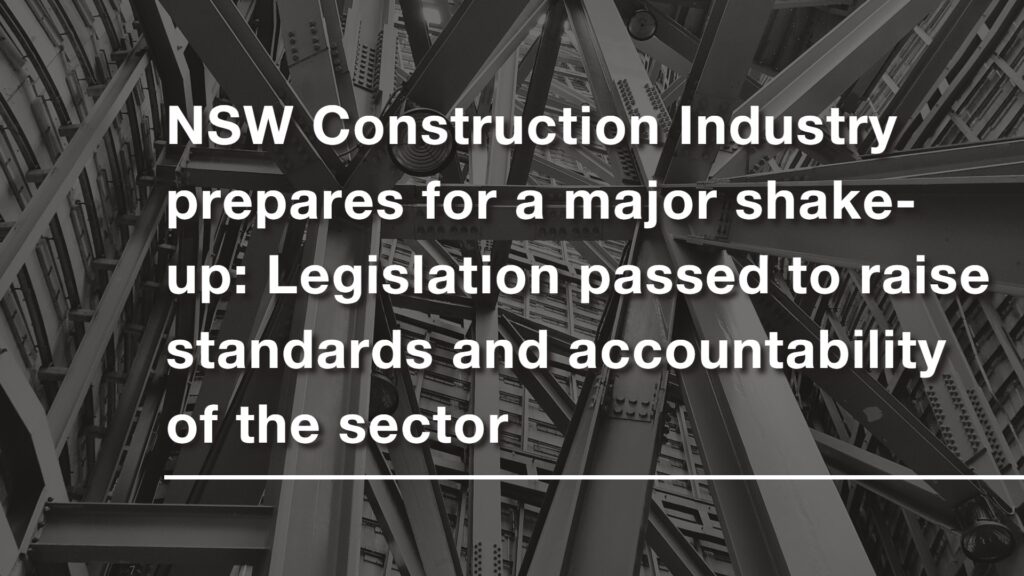In our update released at the end of 2019, we highlighted that the NSW Government had proposed new laws designed to “weed out bad builders” and restore confidence in the NSW construction industry following the highly publicised defective construction works in Sydney’s Opal and Mascot Towers.
Recently, the NSW Parliament passed two significant pieces of legislation as part the Government’s response to raise standards and accountability in the NSW building sector. The Minister for Better Regulation described the two Bills as the start of “the biggest shake-up of the building sector NSW has ever seen”.
Design and Building Practitioners Bill 2020
Last week, the long-awaited Design and Building Practitioners Bill 2020 (NSW) (DBP Bill) was assented to by the NSW Governor. The DBP Bill is set to apply to all parties involved in the design and construction of residential or mixed-use developments in NSW and will be implemented from 1 July 2021. The new laws will significantly impact the liability of construction professionals through the introduction of a number of reforms. These include:
- Statutory Duty of Care: A person who carries out construction work has a duty to exercise reasonable care to avoid economic loss caused by defects— (a) in or related to a building for which the work is done, and (b) arising from the construction work. The duty of care is owed to each owner of the land in relation to which the construction work is carried out and to each subsequent owner of the land. Note: this statutory duty departs from the current state of law – see our summaryon Woolcock Street Investments Pty Ltd v CDG Pty Ltd (2004) 216 CLR 515 and Brookfield Multiplex Ltd v Owners Corporation Strata Plan 61288 (2014) 313 ALR 408).;
- Compliance Declarations: introducing the requirement for:
- Design practitioners who design certain building work to be registered and provide “design compliance declarations” confirming that the design complies with the Building Code of Australia (BCA) and other requirements to be prescribed by regulations; and
- Building contractors will be required to provide “building compliance declarations” confirming compliance with the BCA and whether the building work was built in accordance with the regulated design; and
- Registration Scheme: introducing a registration scheme for design and building practitioners who are subject to compliance declaration requirements and to establish insurance requirements for registered practitioners.
The sweep of reforms also saw the introduction of the Residential Apartment Buildings (Compliance and Enforcement Powers) Bill 2020 (NSW) (RAB Bill). The aim of the RAB Bill is to prevent developers from carrying out building work that may result in serious defects to building work or result in significant harm or loss to the public or current or future occupiers of the building. The key reforms are set to commence on 1 September 2020 and include:Residential Apartments Buildings Bill 2020
- enabling the NSW Department to:
- issue a stop work order if building work is being carried out, or likely to be carried out, in a manner that could result in a significant harm or loss to the public or current or future occupiers of the building; or
- issue a building work rectification order to require developers to rectify defective building works’; or
- prohibit the issuing of an occupation certificate in relation to building works in certain circumstances;
- imposing an obligation on developers to provide notice to the Department of a proposed application for an occupation certificate at least 6 months before the application is made; and
- enabling the Building Commissioner to investigate and enforce a wide range of powers to gather information, conduct inspections, enter construction sites and investigate building defects.
CDI Lawyers will keep you up to date with any further developments in relation to both the DBP and RAB Bill as and when they unfold.
This publication does not deal with every important topic or change in law and is not intended to be relied upon as a substitute for legal or other advice that may be relevant to the reader’s specific circumstances. If you have found this publication of interest and would like to know more or wish to obtain legal advice relevant to your circumstances please contact one of the named individuals listed.



